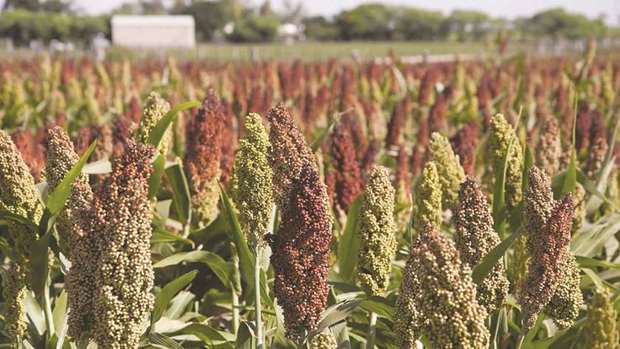China will slap hefty anti-dumping deposits on imports of US sorghum from yesterday, the government said on Tuesday, a higher-than-expected charge on the grain used in livestock feed and the spirits industry, as trade tensions escalate between the world’s top two economies.
CHS Inc and other US companies will have to put up a 178.6% deposit on the value of sorghum shipments to the country in what Beijing called a temporary measure, as the government continues to probe imports of the grain.
Traders said the deposit was high enough to bring US imports to a halt and inflate prices of alternatives, such as barley.
Sorghum is used in livestock feed and the fiery Chinese liquor baijiu.
“De facto, it stops all the trade,” said Mike O’Dea, a US trader for broker INTL FCStone.
The deposit on sorghum comes after Beijing had already threatened a tariff on the grain along with US soybeans.
China purchased $12bn worth of US soybeans last year, making it the most valuable US agricultural export to China.
The United States shipped 4.76mn tonnes of sorghum to China in 2017, worth around $1.1bn and making up the bulk of China’s roughly 5mn tonnes of imports of the grain last year, according to Chinese customs data.
Just last week, about 116,000 tonnes of US sorghum was shipped from Texas, US Department of Agriculture data showed on Monday.
The US Trade Representative’s office said in a statement it would “carefully review China’s measures on sorghum and take action as warranted, including through a World Trade Organisation case if appropriate.”
White House deputy press secretary Lindsay Walters added that Trump “has made it clear that any further illegal trade actions by China are not acceptable, including the unfair targeting of US sorghum producers.”
Walters also acknowledged recent announcements by Beijing about easing ownership limits in some sectors, such as autos.
“While we appreciate that China is recognising longstanding US concerns about discriminatory practices in the autos, ship, and aircraft sectors, we await actual implementation of any policy change,” she said.
The National Sorghum Producers, which represents US farmers, maintained that the crop is not being dumped in China.
“Today’s decision in China reflects a broader trade fight in which US sorghum farmers are the victim, not the cause,” the group said.
China’s move comes out of an anti-dumping investigation launched two months ago in retaliation for aggressive trade actions by Washington, including steep tariffs on solar panels and washing machines.
Beijing said it found the domestic industry was “substantially damaged” by US sorghum imports being dumped into the country.
It said it will issue a final ruling at a later date, but did not give a timeline.
Other companies likely to be affected by the deposits are Archer Daniels Midland, a top seller of US sorghum into China, Cargill and Louis Dreyfus.
ADM spokeswoman Jackie Anderson said the company is analysing how this will impact ADM and what actions the company will take, both from a business and legal perspective.
“We are very disappointed with this decision,” Anderson said. “We do not believe that exporter-specific cost and price calculations were adequately considered, or that the proposed remedies are warranted.”
Cargill could not be reached for comment. CHS and Dreyfus declined to comment.
Prices of soymeal and rapeseed meal used in animal feed jumped on the sorghum deposit news as traders worried China had penalties in store for other US agricultural products.
Curbing imports of grains is considered one of the most powerful weapons Beijing can use in the trade row.
Midwestern US farmers are a core of Trump’s political base, and a surplus on the global grain market has growers worldwide struggling to find profitable markets.
US farm income has dropped by more than half since 2013, as years of massive harvests have depressed prices for staple crops.
China’s deposit would devastate Kansas, the top US sorghum-producing state which supported Trump in the presidential election, Governor Jeff Colyer said in a statement.
“Instead of targeting fairly traded US exports, China should immediately stop its unfair trading practices,” he said.
Trade experts and farmers said Beijing’s decision to limit imports of feed ingredients could boost costs for China’s own vast livestock sector and might also inflate retail pork prices in the world’s top consumer of the meat.
The scale of China’s deposit devastated traders who had rushed to increase imports prior to the ruling.
A trader with an international firm estimated more than 2mn tonnes of sorghum were on the water heading for China.
A source at another international trading house said the sector had expected a lower deposit, close to 35%.
Imports are usually high in April and May, and cargoes en route are likely to get diverted to other points in Asia, traders said.
Japan could buy some sorghum that had been destined for China, said Ken Morrison, a US trader who worked for Cargill and now publishes a commodity newsletter. Sales of sorghum to China that have not yet been shipped will likely be cancelled, he said.

US companies will have to put up a 178.6% deposit on the value of sorghum shipments to China in what Beijing called a temporary measure, as the government continues to probe imports of the grain. Traders said the deposit was high enough to bring US imports to a halt and inflate prices of alternatives, such as barley.
